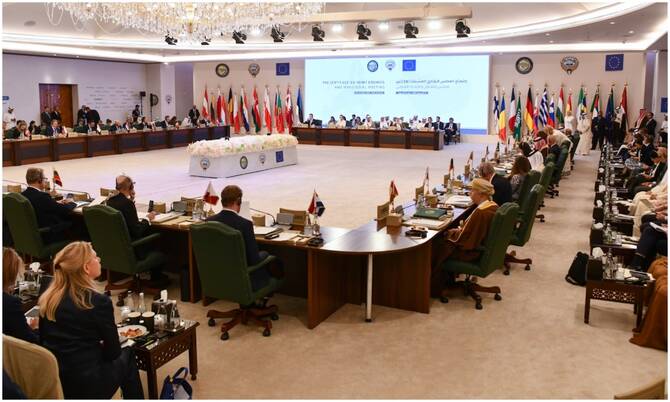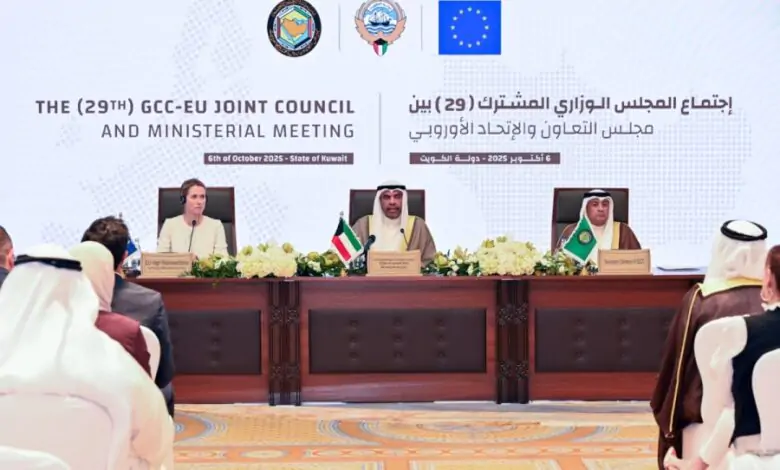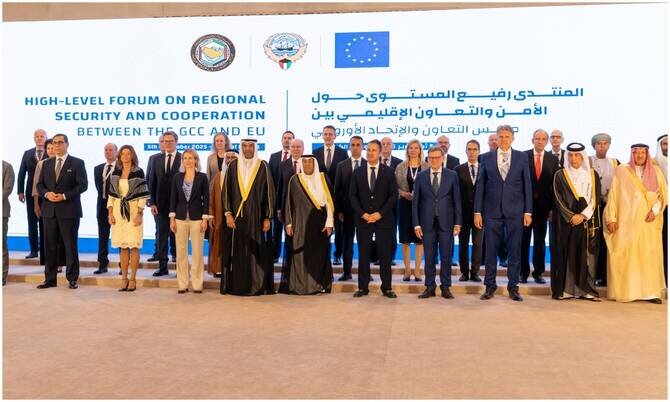GCC-EU Strategic Partnership took a significant leap forward in October 2025, as the State of Kuwait successfully hosted the 29th Joint Council and Ministerial Meeting between the Gulf Cooperation Council (GCC) and the European Union (EU). Chaired by Kuwait’s Minister of Foreign Affairs, H.E. Abdullah Ali Al-Yahya, representing the current GCC Ministerial Session, and co-chaired by H.E. Kaja Kallas, the EU High Representative for Foreign Affairs and Security Policy, the meeting was a powerful demonstration of the two blocs’ commitment to deepening a relationship that began nearly four decades ago with the 1988 Cooperation Agreement.
The high-level discussions, held amidst complex regional and global geopolitical challenges, culminated in a joint statement that reaffirmed the GCC-EU partnership as a crucial pillar for international peace, security, and prosperity. It wasn’t just a restating of old ties; the meeting served as a vital mechanism to translate the ambitious vision set out during the first-ever GCC-EU Summit in Brussels in 2024 into concrete, actionable steps across critical sectors—from economics and energy to security and education.
A Foundation for Global Stability: Reinforcing the GCC-EU Strategic Partnership
The meeting in Kuwait underscored a shared belief in a rules-based international order, respect for international law, and the necessity of multilateralism to address global challenges. Both sides acknowledged that in an era of unprecedented volatility, their coordinated action is more vital than ever. The partnership is now explicitly structured to be the driving force behind their common objectives, anchored in mutual respect and shared interests.
The ministers praised the outcomes of the 2024 Brussels Summit and eagerly anticipated the next summit, scheduled to be held in the Kingdom of Saudi Arabia in 2026. This regular cadence of high-level interaction reflects a mature, evolving relationship moving from mere cooperation to a fully-fledged strategic alliance. A key theme throughout the discussions was the effective implementation and operational follow-up of the agreements made, ensuring that the partnership delivers tangible benefits to the citizens of both regions.
Turbocharging Trade and Economic Resilience
The economic agenda was a central pillar of the 29th Ministerial Meeting, reflecting the sheer scale and potential of the combined GCC and EU markets. The EU is already a significant trading partner for the GCC, and the commitment to accelerate economic integration was palpable.
The most anticipated outcome in the economic sphere was the renewed impetus to strengthen trade and investment ties and actively explore the resumption of Free Trade Agreement (FTA) negotiations. This move signals a willingness to overcome previous hurdles and tap into the vast potential of an FTA, which could streamline trade, reduce barriers, and significantly boost mutual investment flows.
Beyond the FTA, specific steps were agreed upon to enhance the business and investment environment:

- Diversifying Supply Chains: A commitment to making supply chains more resilient and diversified, crucial in the current global economic climate.
- Digital Trade and Green Economy: A focus on supporting digital trade and the rapidly growing green economy, highlighting new avenues for collaborative investment in forward-looking sectors.
- Business and Macroeconomic Dialogue: The meeting commended the success of the 8th GCC-EU Business Forum held in Doha and encouraged active participation in the upcoming 9th Forum in Kuwait in November 2025. This, along with plans for the next Macroeconomic Dialogue in December 2025, ensures continuous dialogue between business leaders and financial policymakers.
The push to create a more conducive business environment, alongside advancing regulatory dialogues, demonstrates a practical approach to enhancing market access and unlocking long-term economic growth for both blocs.
Comprehensive Security Cooperation: Addressing Shared Threats
Security—in its broadest sense—formed the second major pillar of the discussions. The ministers recognized that regional security in the Gulf is inextricably linked to the security of Europe. The meeting highlighted the importance of the Second High-Level Ministerial Forum on Regional Security and Cooperation, held just a day earlier in Kuwait, which provided a crucial platform for detailed dialogue on pressing issues.
Practical and tangible steps were announced to enhance security cooperation:
- Counterterrorism and Crime: Both sides agreed to establish a Joint Working Group on Counterterrorism. This builds upon a foundational meeting of directors of criminal investigation and intelligence held earlier in Abu Dhabi, signaling a strong resolve to cooperate on countering extremism, migrant smuggling, and other organized crime.
- Maritime and Cyber Security: The officials welcomed ongoing efforts, including the Maritime Security Symposium in Brussels and the Cyber Diplomacy Roundtable in Riyadh. The protection of vital sea lanes, especially in the Red Sea, and securing digital infrastructure were emphasized as core shared interests critical for global trade and stability.
- Disaster and Emergency Preparedness: A concrete administrative arrangement was welcomed: the signing of a Memorandum between the Gulf Emergency Management Centre and the European Commission’s Directorate-General for Civil Protection. This is complemented by the launch of the Radiation Data Exchange Platform (GCC-RDEP), significantly improving their joint capability for disaster response and emergency management.
Green Energy and Climate Action: A Shared Future
With the GCC states being global energy leaders and the EU at the forefront of the green transition, collaboration on energy and climate issues is a natural and high-impact area for the GCC-EU Strategic Partnership.
The joint statement placed a strong emphasis on cooperation in clean energy, particularly in hydrogen, energy efficiency, carbon capture, and other green transformation technologies. The two blocs reaffirmed their commitment to the Paris Agreement and pledged to intensify efforts to combat climate change, biodiversity loss, and desertification. Upcoming initiatives, such as the Energy Conference and Green Transformation Forum in Riyadh and the Investment Forum in Abu Dhabi, will serve as platforms to drive investment in these key areas, leveraging the EU’s technology and the GCC’s capital and commitment to energy transition.
Fostering Human Ties: Diplomacy, Education, and Youth
Recognizing that the long-term strength of the partnership rests on people-to-people connections, the Ministerial Meeting announced several initiatives focused on education, research, and diplomacy:

- Educational Exchange: Both sides agreed to expand cooperation through the EU’s flagship programs, Horizon Europe for research and innovation, and Erasmus+ for education and training.
- Youth Engagement: The meeting celebrated the launch of the Young Leaders in Regional Diplomacy Program in Kuwait, which brought together diplomats from both regions. Furthermore, plans were announced to establish a regional focal point to support youth initiatives and emerging enterprises, creating a pipeline of talent and ideas that will sustain the partnership for future generations.
- Travel Facilitation: A key topic of discussion was the mutual visa waiver scheme for the Schengen Area, which the GCC Secretariat is actively pushing to expand for GCC citizens, reflecting the growing human and cultural ties between the regions.
Unified Stance on Critical International Issues
In a reflection of the deep political dialogue central to the GCC-EU Strategic Partnership, the ministers addressed the most pressing regional and international issues, demonstrating significant alignment on core foreign policy principles:
- The Question of Palestine and Gaza: The Council condemned the ongoing military escalation and reiterated its firm support for a two-state solution based on the Arab Peace Initiative, UN resolutions, and the 1967 borders. They called for an immediate and permanent ceasefire, full humanitarian access, and compliance with international law, while welcoming international efforts, including the US peace plan and the New York Declaration, aimed at a peaceful settlement.
- Regional Stability: The ministers reaffirmed the need to resolve regional disputes through dialogue, including emphasizing the importance of resolving maritime boundary issues between Iraq and Kuwait under international law. On Iran, they stressed the principles of sovereignty and non-interference, expressed concern over renewed nuclear sanctions, and urged cooperation with the IAEA.
- Yemen and the Red Sea: The joint statement reaffirmed support for a comprehensive, UN-led political process in Yemen and praised the mediation efforts of Saudi Arabia and Oman. Furthermore, they urged the Houthis to cease attacks in the Red Sea to ensure the freedom and security of global navigation.
Conclusion: A Partnership for a Changing World
Kuwait’s successful chairmanship of the 29th Joint GCC-EU Council and Ministerial Meeting was far more than a routine diplomatic gathering; it was a powerful signal of an accelerating strategic alignment. By moving aggressively to enhance cooperation on an FTA resumption, establishing concrete security mechanisms like the Joint Counterterrorism Working Group, and investing in the green transition through hydrogen and carbon capture initiatives, the GCC and the EU are building a resilient, future-oriented partnership.
The clear and unified messaging on complex geopolitical challenges, from Gaza to energy security, reinforces the role of the GCC-EU Strategic Partnership as a pillar of stability in a rapidly shifting world. The outcomes of the Kuwait meeting lay down a clear, practical roadmap for the years ahead, promising a period of intensified collaboration that will undoubtedly benefit both regions and contribute significantly to global prosperity and security.
Do Follow Gulf Magazine on Instagram
Also read: Saleeg: 7 Amazing Facts About Saudi’s Comfort Dish



